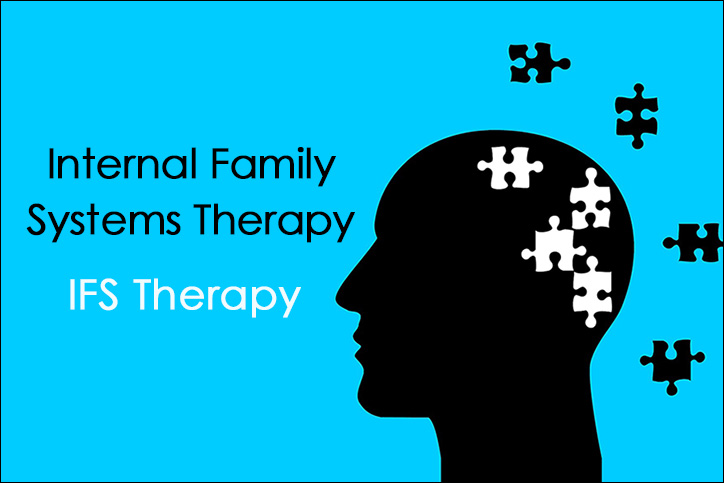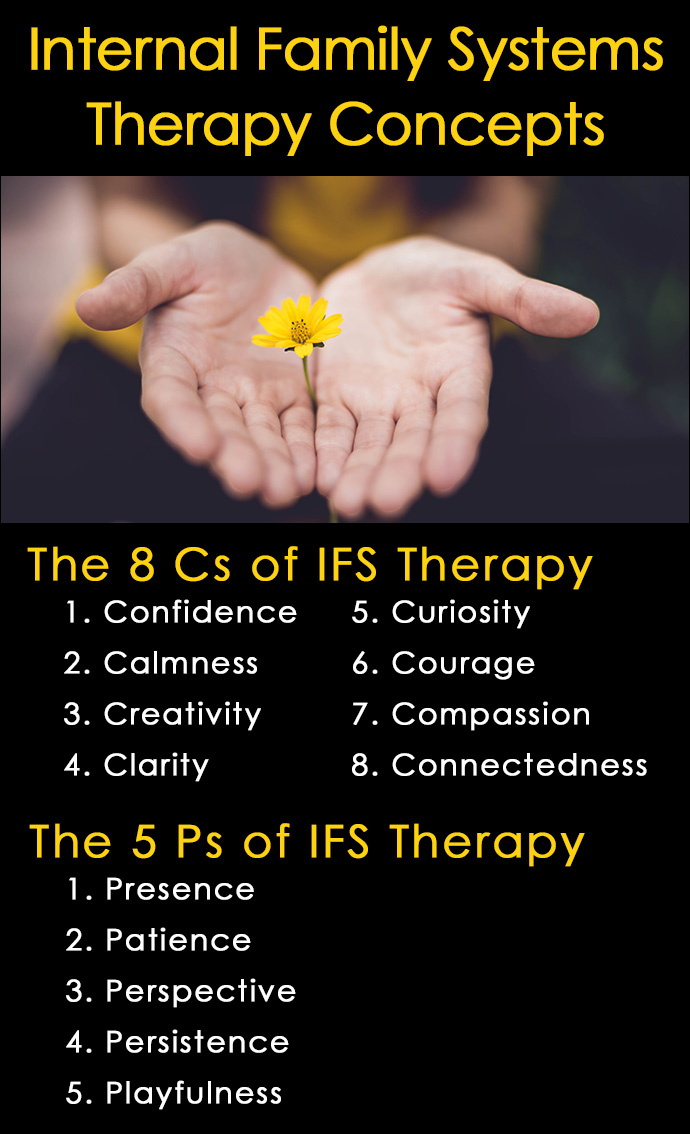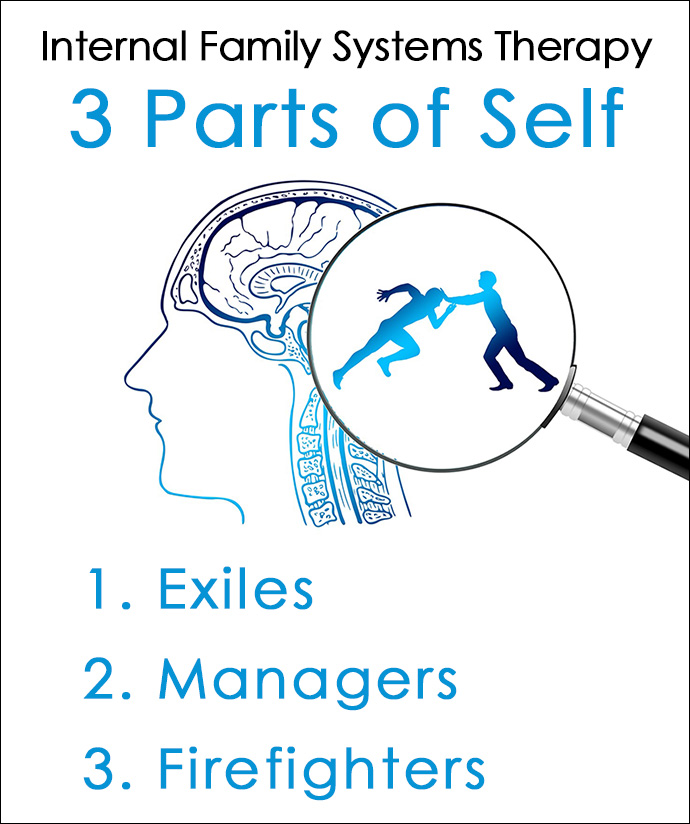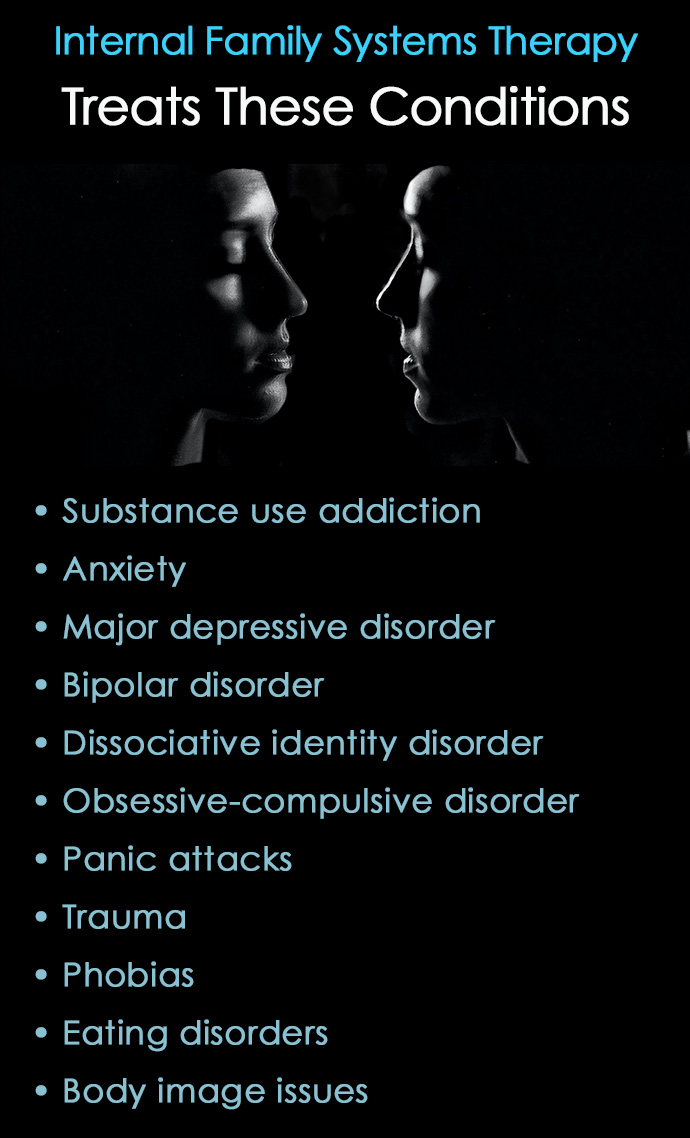Table of Contents
Internal Family Systems Therapy, also referred to as IFS Therapy, is a psychotherapy approach to promote healing and trust for treating mental health issues and substance use disorders.
IFS Therapy is a one-on-one, individualized treatment approach between a therapist and client patient that nicely complements other popular therapies aimed at addiction and mental health recovery.
As the treatment progresses, it will generate an increased level of trust between the therapist and the patient. More importantly, the patient will develop a better relationship of trust with his or her own self during the healing process.
What is Internal Family Systems Therapy (IFS)?
The underlying concept of Internal Family Systems Therapy is that everyone has several parts living within the mind that fill both healthy and unhealthy roles in our lives.
According to IFS theory, traumatic events and other life circumstances can push healthy roles into more damaging or extreme roles.
The approach was developed in the late 1980s by psychologist Richard Schwartz, who was trained in Family Systems Therapy theory while working as a family therapist.
Schwartz’s therapeutic approach suggests unhealthy or extreme internal roles within the mind can be changed with time and work. The process works to encourage healthy healing and promote trust in one’s self by coordinating all the roles that make up a person’s inner self.
In 2015, Internal Family Systems Therapy was recognized as an evidence-based practice by the National Registry for Evidence-based Programs and Practices (NREPP).
The NREPP is a national registry that is maintained by the Substance Abuse and Mental Health Services Administration (SAMHSA).
Because IFS Therapy is evidence-based, it is offered in non 12 step rehab programs for addiction and dual diagnosis treatment.
Internal Family Systems Therapy Concepts
The existence of the “Self” is a core concept of Internal Family Systems Therapy. The approach suggests that the mind functions like a family, with various parts or traits that can be positive (healthy) or negative (unhealthy).
Every person’s Self is comprised of eight different parts known as the Eight Cs and the Five Ps.
The Eight Cs of IFS Therapy include:
- Confidence
- Calmness
- Creativity
- Clarity
- Curiosity
- Courage
- Compassion
- Connectedness
The Five Ps include:
- Presence
- Patience
- Perspective
- Persistence
- Playfulness
When a person is in harmony with their internal self, they will usually identify with one or more of the above qualities. Being able to access the self is the first step toward the healing system.
3 Parts of Self in Internal Family Systems Therapy
IFS Therapy defines three main categories of parts that make up the self, known as Exiles, Managers, and Firefighters.
The 3 Parts of Self
1. Exiles
Exiles are the parts of the self that hold the most traumatic, extreme memories and feelings, which can include things like abuse, humiliation, shame, and neglect, among others.
It can take an inordinate amount of work to keep exiles out of our conscious awareness.
2. Managers
Managers are parts that serve as proactive protectors, working to keep exiled parts from coming to the surface and out of the self’s awareness.
The fear of the managers is that exiled parts will overwhelm the self with the extreme memories and feelings they hold.
3. Firefighters
Firefighters are reactive protectors that enter when exiles have broken through a manager’s defense.
These can be behaviors like alcohol and drug abuse, binge eating, self-harm, or suicide attempts. The goal of the firefighter is to stop the pain produced by exiles.
What Issues Does Internal Family Systems Therapy Treat?
Internal Family Systems Therapy was originally developed to help people suffering from eating disorders, but has since been adapted to treat a wider range of mental health conditions.
IFS Therapy is Effective for Treating the Following Conditions:
- Substance use disorders and addiction
- Anxiety
- Major depressive disorder
- Bipolar disorder
- Dissociative identity disorder
- Obsessive-compulsive disorder
- Panic attacks
- Trauma
- Phobias
- Eating disorders
- Body image issues
As a therapeutic approach, internal family systems therapy can also be effective for helping people cope with normal life stressors, such as grief, problems with self-esteem, career, and relationship issues.
During the healing process, it often works well as a way to increase a person’s resilience where challenges are concerned.
How is IFS Therapy Different Than Other Types of Therapy?
On the surface, a session of internal family systems therapy resembles other conventional forms of counseling or talk therapy.
However, IFS Therapy moves away from traditional psychotherapy because it is less solution focused than other approaches such as Cognitive Behavioral Therapy (CBT).
Internal Family Systems Therapy works to help people improve trust with their inner self and to become more self-led.
This approach is based on the idea that as a person learns to trust their own leadership, damaging behaviors and patterns of thought will naturally start to diminish.
There is no attempt with internal family systems therapy to teach people how to change their thoughts like with CBT or other similar therapies.
Instead, IFS Therapy focuses on where a particular thought is coming from in order to gain access to that wounded or traumatized part of the self and encourage healing.
Because it works for both mental health and addiction, it can be beneficial for dual diagnosis treatment of co-occurring disorders.
Internal Family Systems Therapy Steps – The 6 Fs
The 6 Fs of Internal Family Systems Therapy are the steps used for working with the protectors, known as the Managers and Firefighters, to protect a person from the harm caused by the Exiles.
The focus of the steps is to create a healthy connection between all of the Parts and the Self so a person functions a positive way.
The 6Fs of IFS Therapy include:
1. FIND – Find the Parts that need work or attention.
2. FOCUS – Focus attention on the Part that needs work.
3. FLESH OUT – Learn more about the Part to begin working on it.
4. FEEL TOWARDS – How do you feel towards this Part as it relates to the 8 Cs (calm, clarity, etc.), as well as how these feelings are connected to the Self and other Parts.
5. BEFRIEND – Learn more about the Part to improve the relationship between the Part and Self.
6. FEAR – Understand what the Part is afraid of and what it wants.
The process of moving through the steps will be different for every person, but over time, it will get easier as healing occurs.
Building a level of trust between the IFS therapist and the client patient is an important aspect of Internal Family Systems Therapy that will lead to a person developing a better relationship of trust with his or her own self.
IFS Therapy can be effective for mental health and addiction treatment because it improves internal harmony of the Self that is necessary for healing and recovery.






